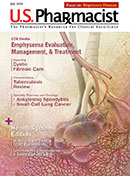Research reveals that the use of high-dose aspirin may precipitate tinnitus, but there is minimal data on the use of typical-dose aspirin and other analgesics.
In a recent longitudinal study published in the Journal of General Internal Medicine, researchers examined independent correlations between the use of aspirin, nonsteroidal anti-inflammatory agents (NSAIDs), and acetaminophen and the risk of incident persistent tinnitus. They found that frequent use of NSAIDs, acetaminophen, or regular use of cyclooxygenase-2 (COX-2) inhibitors was linked with an elevated risk of tinnitus. The use of low-dose aspirin use did not elevate the risk, but frequent moderate-dose aspirin use was correlated with a higher risk of persistent tinnitus among women aged younger than 60 years.
The study involved 69,455 women who were participants in the Nurses' Health Study I as part of the Conservation of Hearing Study—a large, ongoing longitudinal examination that studies risk factors for hearing loss and tinnitus among participants in several prospective cohort studies.
Women's ages ranged between 31 and 48 years at the time of enrollment in the study, and subjects were followed for over 20 years. The primary outcome assessed was incident (new onset) persistent tinnitus, defined as tinnitus that was experienced by the participant several days per week or more. The team also analyzed alternative definitions of tinnitus, including persistent tinnitus lasting 5 minutes or longer and tinnitus experienced every day. This information was obtained from the participants answering questions (before the development of tinnitus) about their use of OTC pain medications as well as use of COX-2 inhibitors—a prescription NSAID with comparable properties to other NSAIDS but with less gastrointestinal adverse effects.
The researchers revealed that 10,452 cases of incident persistent tinnitus were reported. They found that frequent use (6-7 days per week) of moderate-dose aspirin was associated with a 16% greater risk of tinnitus among women aged younger than 60 years, but not among older women.
Frequent low-dose aspirin (≤100 mg) was not associated with elevated risk of developing tinnitus, and frequent use of NSAIDs or frequent use of acetaminophen was associated with an almost 20% higher risk of developing tinnitus. The extent of the elevated risks inclined to be higher with regular use. They also found that regular use (2 or more days per week) of COX-2 inhibitors was linked with a 20% higher risk of developing tinnitus.
The authors of the study indicated that limitations of their study were that information on tinnitus and analgesic use was self-reported by participants, and the researchers needed to rely on self-reporting due to the nature of the condition and subjective tinnitus being perceived only by the individual. They noted that the observational design of the study did not enable them to assign causality. Additionally, the study population was predominantly Caucasian, and all participants were female, so further study of non-Caucasian populations and men is required.
They concluded that the risk of developing persistent tinnitus was not raised among frequent low-dose aspirin users; however, among younger women, frequent moderate-dose aspirin usage was linked with a higher risk. They wrote, "Our results suggest analgesic users are at higher risk for developing tinnitus and may provide insight into the precipitants of this challenging disorder, but additional investigation to determine whether there is a causal association is needed."
In an interview, lead author Sharon Curhan, MD, ScM, of the Brigham Channing Division of Network Medicine, stated, "Our findings suggest that analgesic users may be at higher risk for developing tinnitus and may provide insight into the precipitants of this challenging disorder. Even though these analgesics are widely available without a prescription, these are still medications, and there are potential side effects. For anyone who is considering taking these types of medications regularly, it is advisable to consult with a health care professional to discuss the risks and benefits and to explore whether there are alternatives to using medication."
The content contained in this article is for informational purposes only. The content is not intended to be a substitute for professional advice. Reliance on any information provided in this article is solely at your own risk.
« Click here to return to OTC Update.






